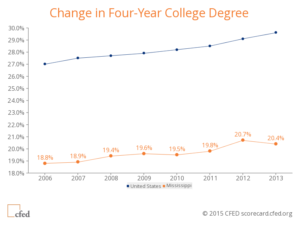Mississippi has one of the nation’s lowest rates of higher education attainment and one of the highest rates of student loan default.
Last month, thousands of Mississippi students from across the state graduated from local community colleges and universities, excited about career opportunities and the potential of the future. Undoubtedly, education is MEPC Logoa fundamental asset that significantly impacts an individual’s earning potential and ability to succeed. However, access to higher education remains a major barrier for thousands of working families and their children, particularly in Mississippi. According to the Corporation for Enterprise Development’s (CFED) 2015 Assets & Opportunity Scorecard, a comprehensive assessment of household financial security in the 50 states and the District of Columbia, Mississippi ranks last in education and was one
of only seven states that did not see an increase in college degree attainment between 2012 and 2013 (the most recent data available). Mississippi should invest in strengthening the financial aid programs offered to students to give more Mississippians an opportunity to go to college.
Two-Year College Degree Attainment
Mississippi ranks fourth to last in two-year college degree attainment, only behind Louisiana, Arkansas, and West Virginia. In Mississippi, 28.8 percent of adults have at least a two-year degree compared to 37.7 percent of adults in the United States (See Chart). Two-year degrees are important to have in today’s workforce, as more and more jobs require that applicants have at least a two-year degree.
Four-Year College Degree Attainment
Mississippi ranks next to last, only ahead of West Virginia, in four-year college degree attainment. In Mississippi, 20.4 percent of adults have at least a 4-year degree compared to 29.6 percent of U.S. adults (See Chart). Individuals from low-income families are also less likely to finish college than individuals from wealthier families, which widens the income gaps over their lifetimes. Four-year degrees are five times more prevalent among the highest-income households than among the lowest-income households (40.3 percent and 8.4 percent, respectively) in the state.
College degree attainment oftentimes results in student loan debt burdens, as a result of higher costs and fewer resources. Fifty-seven percent (57.0 percent) of Mississippi college students graduate with student loan debt, with an average of $27,571 in student loans. Mississippi also has the seventh highest borrower default rate in the nation – 16.3 percent of Mississippi borrowers entering repayment defaulted on their student loans within three years. High student loan default rates may provide insight into broader issues: that recent graduates have unmanageable debt burdens or are unable to secure jobs that pay a sufficient wage to cover these debt payments (Assets & Opportunity Scorecard).
Higher education creates economic prosperity for individuals and the economy as a whole. To enhance access to post-secondary education and make it more affordable, the state can strengthen and update its current financial aid programs. For recommendations, please see MEPC’s report, Investing In Our Future.
 Jessica Shappley is a Policy Analyst for the Mississippi Economic Policy Center. Her work focuses on asset-building, economic development, and housing issues. Jessica attended Mississippi State University, where she earned a Master of Public Policy and Administration degree and a Bachelor of Arts in English and Communication with a concentration in journalism. You can contact her at jshappley@hope-ec.org.
Jessica Shappley is a Policy Analyst for the Mississippi Economic Policy Center. Her work focuses on asset-building, economic development, and housing issues. Jessica attended Mississippi State University, where she earned a Master of Public Policy and Administration degree and a Bachelor of Arts in English and Communication with a concentration in journalism. You can contact her at jshappley@hope-ec.org.
Rethink Mississippi is an outlet for insight, analysis, and commentary about the issues facing Mississippi’s rising generation — written by people who are committed to making a difference in the state. RM is sponsored by the William Winter Institute, which works with communities in Mississippi and around the world to end all discrimination based on difference.



